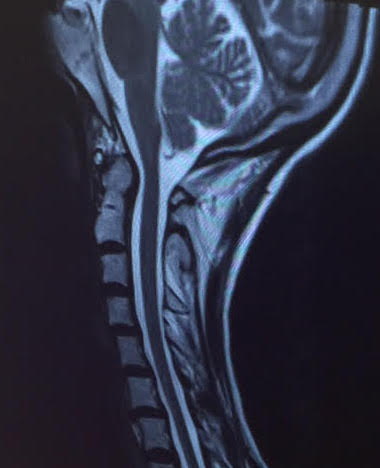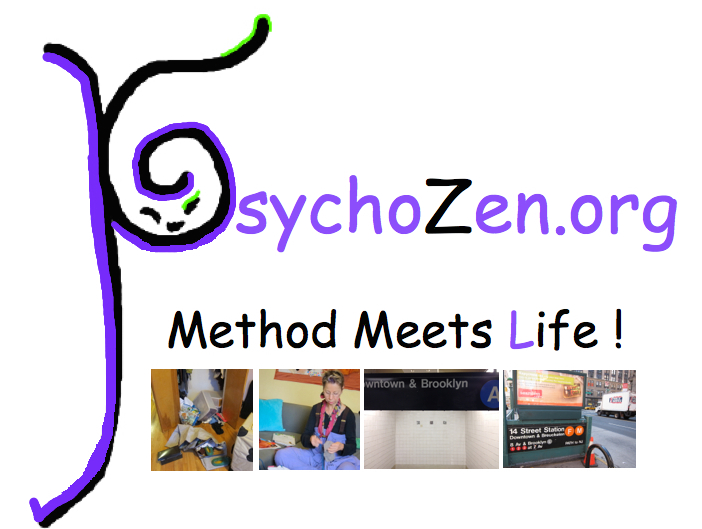Yes, Doctor. May I see your computer?
 It started out well enough. The pain specialist in the spine department--let's call him Dim--was friendly and respectful, and did a quick and gentle exam of my neck. Then he brought me into his office, offered a seat while he communicated with his computer as he complained that electronic medical records were ruining his practice. I sympathized; he continued on about how this keeps him up at night, then asked me many questions that had nothing to do with my neck, presumably required by the machine he was facing. After 10 minutes he finally looked at my X-ray and MRI and said that not only could he not do anything for me, but also I needed to have surgery immediately to fuse my neck or I could wake up paralyzed. "It could even happen the night before your surgery," said Dim. When I protested that I couldn't dance with a fused neck, he replied: "Some bodies aren't meant to dance."
It started out well enough. The pain specialist in the spine department--let's call him Dim--was friendly and respectful, and did a quick and gentle exam of my neck. Then he brought me into his office, offered a seat while he communicated with his computer as he complained that electronic medical records were ruining his practice. I sympathized; he continued on about how this keeps him up at night, then asked me many questions that had nothing to do with my neck, presumably required by the machine he was facing. After 10 minutes he finally looked at my X-ray and MRI and said that not only could he not do anything for me, but also I needed to have surgery immediately to fuse my neck or I could wake up paralyzed. "It could even happen the night before your surgery," said Dim. When I protested that I couldn't dance with a fused neck, he replied: "Some bodies aren't meant to dance."
Weeks of terror ensued while I waited for a surgery appointment. Ultimately, the surgeon disagreed, assessing my risk of paralysis in the near future to be minimal.
We can fix this sort of thing. All we have to do is accept what was obvious and terrifying to Dim. The machine would do a much better job. Our problem is that we expect doctors to be healers. That day is long gone. Threats of lawsuits, the insurance industry, diagnostic machines (Xrays, etc.), have converted the medical exam from an act of listening and feeling and advising to an almost antagonistic review of systems and risks. Medical training in differential diagnosis has always been narrow but there was a time when doctors used it as a springboard and were still able to listen.
Someday, maybe, I'll write at length about my experience training doctors to communicate, but for now, trust me, the system is so stacked against them that it is folly to try. So, if all they can do is evaluate whether or not your problem fits into their narrow slice of expertise, why don't we bypass them entirely and go to the source? Instead of going to ten doctors to learn that none of them can help, why not just go straight to the computer, plug in symptoms, history, etc, and let the software do the differential diagnosis. Doctors know which tests to order, you say? Hardly. They all order what they tend to order. They want the xrays before they see you.
The biggest challenge, as I see it, is how to evaluate the evidence for what treatment to use, but MDs are not really helpful here either. Very few are trained in or have any solid understanding of how to evaluate a clinical study or an epidemiologic review. They treat according to the protocol they have learned. So, all we need, really is a guide, someone to help us through the diagnostic decision tree, then help us choose a treatment. Once we know what we want to do, we can see the appropriate healer.
Seriously, this would solve a lot of problems. The good doctors could be left alone to do what they do best. The bad ones could have their humanity rehabilitated--maybe start them off waiting tables, conclude with massage therapy. Then perhaps they could return to practice true medicine. Oh, yeah, and our country would save a lot of money, which we can use to educate, support artistic and creative endeavors, research alternative medicine and renewable power soures, and...and...and...

 Share Article →
Share Article →
Reader Comments